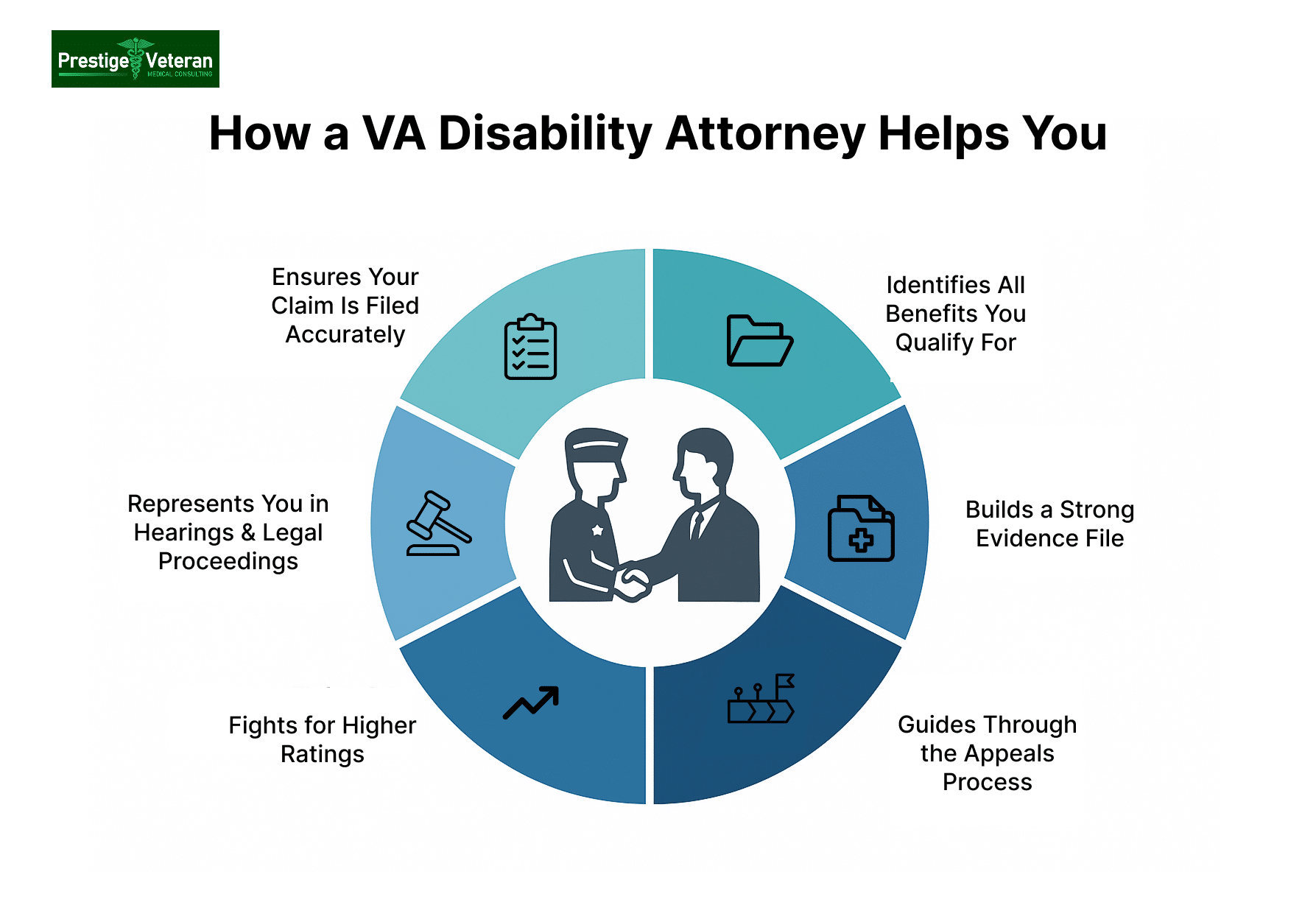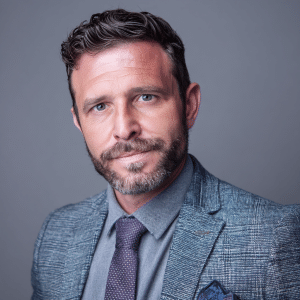A VA disability attorney serves as a vital ally for veterans when they are facing a claim denial or an unfair disability rating. In these situations, they help veterans understand their rights, avoid common pitfalls, and fight for the full benefits they have earned through service.
This comprehensive guide outlines what a VA disability attorney is, how they support your claim, and the costs associated with legal representation. Whether you are beginning a VA claim or challenging a decision, this resource will help you make informed decisions about legal assistance.
Table of Contents
What Is a VA Disability Attorney?
A VA disability attorney is a legal professional accredited by the Department of Veterans Affairs (VA) to represent veterans in disability claims and appeals. Their primary focus is to help veterans prove that a current physical or mental condition is directly connected to military service and ensure they receive the deserved compensation. Only those attorneys approved through the VA’s accreditation process can provide legal services in veteran claims.
The VA recognizes three types of accredited representatives that can handle disability claims:
- Attorneys: Licensed and trained in VA law, they must complete specific continuing education.
- Claim Agents: Non-attorney representatives who pass a VA-administered exam and meet character requirements.
- Veterans Service Organization (VSO) Representatives: Often volunteers from organizations like the DAV or American Legion who assist free of charge.
Veterans can verify if a representative is accredited using the VA Office of General Counsel’s database. Hiring an accredited, experienced attorney ensures compliance with VA guidelines and ensures your case is handled with the professionalism it deserves.
The Essential Role of a VA Disability Attorney
A skilled VA disability attorney brings valuable expertise, strategy, and legal strength to your claim or appeal. Here are the roles these lawyers play in securing veterans’ rightful benefits.
1. Filing and Submitting VA Claims Correctly
Many VA claims are denied simply due to incomplete forms or missing documentation. A VA disability attorney helps veterans ensure that all claim forms are filled out properly, attached with necessary evidence, and submitted on time. This significantly reduces the risk of unnecessary delays or denials due to procedural errors.
2. Identifying All Eligible VA Benefits
One undervalued role of a lawyer for VA disability is that they uncover all potential benefits veterans may not realize they are entitled to, such as secondary service-connected conditions, TDIU, or survivor benefits. Before filing or appealing a claim, a VA disability lawyer conducts a thorough evaluation of your medical and service records.
By using their deep knowledge of the VA’s Schedule for Rating Disabilities (38 CFR, Part 4), the lawyer aims to secure the highest compensation possible based on your disability impact with the earliest possible effective date – to maximize not just the monthly compensation, but also to maximize your back pay.
3. Gathering Medical and Service Evidence
The key role of VA disability attorneys is to help veterans prove that a current physical or mental condition is directly connected to their military service and to ensure VA assigns the highest possible rating with the correct effective date. Experienced attorneys understand exactly what type of proof the VA needs to establish a service connection and achieve a fair disability rating.
A skilled attorney for a VA disability claim gathers comprehensive evidence, such as:
- Service treatment and personnel records
- Independent medical opinions or “nexus letters” from qualified professionals linking your disability to service
- Statements from fellow service members (“buddy statements”)
- Updated private healthcare records
- Denied Compensation and Pension (C&P) exam notes
This supporting evidence helps create a compelling, well-documented case. Attorneys work closely with doctors or medical experts to present a cohesive, evidence-based argument that strengthens your VA claim, especially during the appeals process.

4. Navigating the Appeals Process
When the VA denies or underrates your disability claim, it is the responsibility of your attorney to challenge this decision. They will carefully review the VA’s findings, identify errors or missing evidence, and may consider appeal options such as submitting a supplemental claim or higher-level review under the Appeals Modernization Act (AMA). The VA claims lawyer also gathers new medical records, organizes supporting documentation, and ensures the deadline of that specific appeal lane is met.
If necessary, the lawyer will represent you before the Board of Veterans’ Appeals (BVA) or the U.S. Court of Appeals for Veterans Claims (CAVC), where they effectively structure and argue your case to achieve the best possible outcome. It is important to note that not all accredited attorneys are admitted to practice law at the CAVC and not all attorneys admitted to CAVC are accredited by VA.
5. Seeking Higher Disability Ratings
If your service-connected condition worsens or you were underrated, a VA-accredited attorney can help file for an increase. They review your medical evidence and rating decisions to ensure your compensation accurately reflects your condition. They can challenge flawed C&P exams, gather new evidence demonstrating how your condition has deteriorated, and fight for a reassessment of your rating.
A veteran’s disability lawyer may pursue higher VA ratings for:
- Worsening service-connected conditions
- Secondary conditions linked to an original injury
- Eligibility for Total Disability Individual Unemployability (TDIU)
Even a small increase in your VA rating can mean higher monthly payments and expanded benefits, especially when pursuing TDIU claims.
For instance, if a service-connected back injury leads to chronic depression, your attorney can file for secondary service connection to increase compensation. If this is a new claim, they may also advise you to file it on your own or with the assistance of a Veterans Service Officer (VSO) as accredited VA attorneys cannot legally charge for assistance with filing new claims. They may advise that if the new claim is denied they may return for further assistance with an appeal.
6. Legal Representation in Hearings and Appeals
When your VA disability claim progresses to a formal hearing before the Board of Veterans’ Appeals or the U.S. Court of Appeals for Veterans Claims, a skilled attorney becomes your advocate. They write legal briefs and conduct oral arguments before judges grounded in VA law and precedent. Their years of legal experience make sure your evidence is clearly presented and your rights are fully protected.
With a VA disability appeals attorney legally representing you, your case gets a real advantage, especially during appeals involving disputed medical opinions or long-standing claims.
7. Providing Trusted Guidance and Ongoing Support
Beyond legal assistance, one of the important roles of a veterans disability lawyer is serving as a steady source of guidance. They explain confusing VA terminology to veterans, update them on status changes, and provide reassurance throughout lengthy review periods. They take on the burden of legal procedures so that veterans can focus on their health and family.
These strategic roles underscore why veterans who hire legal representation often achieve better outcomes more quickly and with fewer headaches.
How to Hire the Right VA Disability Attorney
1. Look for VA Accreditation
To ensure proper representation, start by verifying that the lawyer is VA-accredited. Only accredited attorneys are legally allowed to handle VA claims, and their names can be confirmed through the VA OGC Accreditation Search Tool.
2. Ask the Right Questions
Interview several attorneys if needed. Look for experience and specialization. Before signing any agreement, ask:
- How long have you practiced VA disability law?
- What’s your experience with cases like mine?
- How do you communicate with clients?
- Do you handle cases through to the Court of Appeals if needed?
- What is your success rate in appeals or increased rating claims?
3. Evaluate Experience and Focus
Choose attorneys who specialize in veterans’ disability claims, not general practitioners. For instance, a lawyer with a background as a former VA adjudicator or with a military service connection will bring their insider knowledge to strengthen your case.
4. Avoid Non-Accredited Representatives
Refrain from hiring lawyers or advocacy firms that:
- Charges upfront fees for initial claims (illegal for initial claims)
- Non-accredited “consultants” who may offer advice but are not authorized to represent you
- Promise fast results or guaranteed wins
5. Use Search Tools
Search for “VA disability attorney near me” or “best VA disability attorney” and check reviews, credentials, and client testimonials. You can also seek referrals from fellow veterans or trusted organizations. Additionally, legal directories, recommendations from Veterans Service Organizations (VSOs), and veteran forums are excellent resources for finding reputable attorneys.
The best VA disability lawyers are committed to securing veterans’ rightful benefits, restoring their dignity, and bringing them lasting peace of mind.
What is the Cost of Hiring a VA Disability Attorney?
Hiring a VA disability attorney usually does not require an upfront payment. By law, in most cases Attorneys work on a contingency fee basis, meaning you only pay if they win your case and recover past-due benefits. There are some situations where attorneys may charge a reasonable hourly rate or flat fee, but most cases are done on a contingency basis.
VA Regulations on Attorney Fees
Under 38 C.F.R. § 14.636, the VA regulates attorney fees to protect veterans from overcharging or unethical practices. Here are the commonly followed rules:
- No fees for initial claims: It is illegal for any attorney to charge for helping file an initial claim. They are only allowed to charge for appeals or supplemental claims after a VA decision has been issued.
- Fees apply only to back pay: Attorneys are paid a percentage of retroactive benefits awarded, not from ongoing monthly payments.
- Typical range: The standard fee for a VA claims attorney falls between 20% and 33.3% of your back pay.
- A fee of 20%-33% of your back pay is considered reasonable by the VA.
- Fees above 33.3% are presumed excessive.
Example: If you are awarded $12,000 in back pay and your agreement is for 20%, the attorney receives $2,400, and you keep $9,600. Your monthly benefits going forward are 100% yours.
Important:
- Veterans should always sign a written fee agreement, and it must be filed with the VA.
- Always verify that your accredited lawyer complies with VA fee regulations to avoid exploitation.
When Do You Need a VA Disability Attorney?
You may want to work with an attorney if you are facing challenges in your VA benefits claim. Consider getting legal help when:
- Your initial claim has been denied.
- Your VA disability rating is lower than expected.
- You need to file an appeal under AMA, whether it’s a Higher-Level Review, Supplemental Claim, or a hearing before the Board of Veterans’ Appeals.
- You want to increase your rating or file a TDIU claim.
- Your case involves complex or secondary service-connected conditions.
Having an experienced VA disability attorney early on your side means your claim is properly developed, well-documented, and given the strongest chance for approval.
Case Study: How an Attorney Helped a Veteran Win His VA Appeal
Disclaimer: The following case study is entirely fictional. It is created for informational and educational purposes only and does not describe any real person, event, or legal matter
After twelve years in the U.S. Army, Michael O., 47, returned home from deployments in Kuwait with more than a few scars. He suffered from chronic insomnia, depression, and worsening sleep apnea, but like many veterans, he endured without treatment. When he finally filed a VA disability claim in 2019, it was denied, stating there was “no documented evidence” of mental health or sleep problems during service.
Attempting a Higher-Level Review
Michael’s conditions soon disrupted every aspect of his life. He struggled to stay awake at work, lost his warehouse job in 2021, and withdrew from his family. Hoping for reconsideration, he filed a Higher-Level Review (HLR), expecting a senior adjudicator to recognize the link between his service and symptoms. However, the HLR upheld the denial, citing a “lack of a medical nexus.”
Turning to Legal Representation
Disheartened, Michael contacted a VA-accredited attorney recommended by a fellow veteran. The attorney carefully reviewed Michael’s old service files and gathered evidence such as:
- Deployment logs were a challenge; the attorney helped the Veteran identify and obtain Buddy letters that explained the hazardous conditions of the deployment, recording his 12-hour night shifts in high-stress conditions, a likely cause of his chronic sleep deprivation
- She also helped him obtain a private sleep study confirming moderate to severe sleep apnea.
- Arranged for a clinical psychologist’s nexus letter linking his depression to prolonged combat stress and disrupted sleep cycles. They also hired a sleep medicine physician to write a nexus letter for his sleep disorder.
Filing a Supplemental Claim
The attorney filed a supplemental claim arguing that the VA had failed to consider the impact of service-related operational fatigue documented in his records. She presented compelling new evidence to include two independent medical opinions (nexus letters).
After six months, the VA reversed its decision, awarding Michael a 70% rating for major depressive disorder and 50% for sleep apnea, combining to an 80% overall disability rating.
Michael also received $29,400 in retroactive pay covering four years of backdated benefits, validating that his suffering was service-related.
Final Thoughts
While veterans can file claims on their own or with help from a VSO, many are denied or underrated due to missing evidence or complex rules. A qualified VA disability attorney understands the system and how to build a strong, well-supported case. From gathering the right evidence to challenging unfair denials, they are experts presenting your case in a way that truly reflects the impact of your service-connected disabilities.
More than legal representation, VA claim lawyers are dedicated to helping you secure the benefits and peace of mind you have earned. With the right advocate by your side, you can move forward with confidence toward a fair outcome.
Frequently Asked Questions (FAQs)
What does a VA attorney do?
A VA benefits attorney helps veterans file, appeal, and maximize their VA disability claims to ensure they receive the compensation they deserve.
How does a VA disability attorney work?
A VA disability attorney reviews your case, builds strong medical and legal evidence, prepares legal arguments, manages all paperwork and deadlines, and represents you before the VA or the Board of Veterans’ Appeals, and sometimes before the Court of Appeals for Veterans Claims (CAVC).
What is the most a VA disability lawyer can charge?
Attorneys operate on a contingency basis, meaning they usually only receive payment (typically 20% to 33.3% of the back pay) if the VA appeal is successful.
Are VA disability lawyers worth it?
In many cases, YES. Experienced VA disability lawyers greatly improve the chances of winning claims or appeals and securing higher, fairer disability ratings.
What are the chances of winning a VA appeal with a lawyer?
Veterans represented by qualified VA disability attorneys generally achieve better outcomes and higher success rates in appeals compared to those who go without legal representation.
Also Read: VA Claim Denied Even With A Nexus Letter? Prepare For Appeals
At Prestige Veteran Medical Consulting, a veteran-owned company, we specialize in Independent Medical Opinions (IMOs) known as Nexus letters.
Our purpose is to empower YOU, the veteran, to take charge of your medical evidence and provide you with valuable educational tools and research to guide you on your journey.
Understanding the unique challenges veterans face, our commitment lies in delivering exceptional service and support.
Leveraging an extensive network of licensed independent medical professionals, all well-versed in the medical professional aspects of the VA claims process, we review the necessary medical evidence to incorporate in our reports related to your VA Disability Claim.
Prestige Veteran Medical Consulting is not a law firm, accredited claims agent, or affiliated with the Veterans Administration or Veterans Services Organizations. However, we are happy to discuss your case with your accredited VA legal professional.














